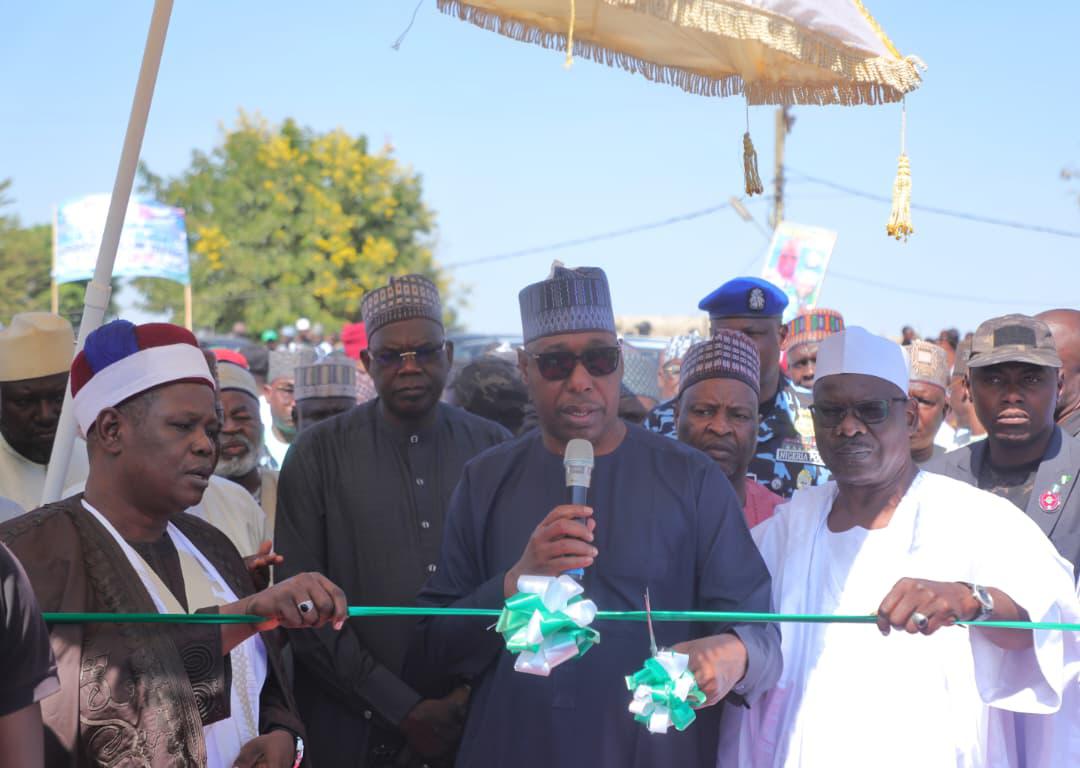
The far-reaching consequences of admission racketeering in the country’s tertiary institutions notwithstanding, the menace is thriving as reflected in the Joint Admissions and Matriculation Board (JAMB) indicting 88 tertiary institutions for conducting admissions outside of its Central Admissions Processing System (CAPS). With over one million illegal admissions carried out between 2017 and 2020, the agency is threatening that it would no longer regularise such admissions, OWEDE AGBAJILEKE reports.
At the recently held 2024 Joint Admissions and Matriculation Board’s (JAMB) policy meeting, one of the stunning revelations made by the examination body was that between 2017 and 2020, some tertiary institutions admitted illegally, over one million students.
A perplexed JAMB Registrar, Prof. Ishaq Oloyede, who describing the trend as worrisome, informed stakeholders, which included the Minister of Education, Prof. Tahir Mamman, Minister of State for Education, Dr Tanko Sununu, heads of tertiary institutions, registrars and admission officers, among others, that most of the students with illegal admissions lacked the basic qualifications to be admitted for courses that they registered to study.
Oloyede listed the five universities involved in the illegal act to include the University of Nigeria Nsukka (UNN); University of Abuja (UNIABUJA); Imo State University (IMSU); Kwara State University (KWASU), and Ambrose Alli University (AAU), Ekpoma.
While the UNN had admission crises for regulated programmes like Medicine, Law, and Nursing, UNIABUJA was accused of issuing admission letters before completing processes on the Central Admission Processing System (CAPS) for 2020, 2021, 2022, and 2023 academic sessions.
Similarly, the JAMB boss accused IMSU and AAU of admission racketeering, adding that both KWASU and Kwara State College of Arabic and Islamic Legal Studies (CAILS) diploma programmes were fraught with irregularities.
Decrying what he termed “corrupt admission into tertiary institutions in Nigeria,” Oloyede lamented that while 600,000 of the admissions have been regularised after intervention by the Federal Ministry of Education, other institutions were still engaged in the act.
In the same vein, an analysis of data on admissions conducted for the 2022/2023 academic session, revealed that 88 higher institutions conducted admissions outside CAPS.
In a statement titled: “Cessation of illegal/irregular admission,” JAMB reiterated that all applications for admissions to first degree, National Diploma, National Innovation Diploma, and the Nigeria Certificate in Education (NCE) into full-time, distance learning, part-time, outreach, and sandwich, must be processed only through the examination body.
The report tagged, “Compiled assessment of institutions on compliance with the 2022/2023 admission guidelines,” scored institutions that complied fully with admission guidelines 10 points; those with partial compliance five points, while those that failed to comply were awarded zero points.
Findings showed that under the section for the conduct of full admissions on CAPS, 88 institutions failed to comply.
In this category, some of the erring institutions include: the University of Uyo (UNIUYO); Olabisi Onabanjo University (OOU), Ago-Iwoye; Yaba College of Technology (YABATECH); Plateau State University; Ladoke Akintola University of Technology (LAUTECH), Ogbomoso; Federal University of Technology Owerri (FUTO); Coal City University; Crawford University, Igbesa; Crescent University; Ebonyi State University; Rhema University, Borno State University, Chrisland University; Federal Polytechnic, Nekede; Alvan Ikoku College of Education, and Chukwuemeka Odumegwu University, among others.
The development came nine months after the National Assembly launched a probe into allegations of admission racketeering in universities across the country.
JAMB’s statutory responsibility is to conduct entrance examinations into the country’s tertiary institutions. The examination body in 2017 introduced the CAPS where universities, polytechnics, colleges of education, and monotechnics were mandated to upload the admission status of candidates offered admission.
The examination body, on its website, explained that CAPS not only automates the admission process into higher institutions, it also eliminates cases of candidates abandoning admissions. The outfit also maintained that admissions conducted outside CAPS are illegal, null, and void.
Furthermore, it explained that CAPS streamlines the admissions process, addresses challenges associated with the manual approach, restores the autonomy of the institutions concerning admissions, makes candidates the focus and empowers them with information on available choices of institutions, and programmes, expands admission opportunities, eliminates multiple admissions, and provides easily retrievable data for decision making and research on the country’s education sector.
Additionally, the procedure helps JAMB to refocus its founding ideals as the clearinghouse for admissions into tertiary institutions.
“Admission process has many stakeholders and actors whose roles and functions have been captured in CAPS. It includes the roles of Admission Officers or the organ saddled with the internal admission process as well as heads of the institution, who have the final approval,” the examination body further explained.
Apart from automating the process, the JAMB boss disclosed that several other innovations are being introduced, including opportunities for candidates to confirm provisional admissions; a marketplace to enable institutions to source candidates from the available pool based on various criteria such as Unified Tertiary Matriculation Examination (UTME) score, state, local council and even gender of the candidates; and the requirement for all awaiting results candidates to upload their results into JAMB portal before being considered for admission.
In addition, the body noted that admissions can be processed in batches, or instantaneously with candidates being able to check their admission status at any point in time on the JAMB portal.
While calling for a probe of the institutions, the National Assembly directed its relevant committees to summon the Minister of Education, Tahir Mamman; JAMB Registrar, Prof. Ishaq Oloyede, as well as, the UNN Vice-chancellor.
In a motion by the senator representing Ebonyi North, Onyeka Nwebonyi, dated November 2023, the lawmaker alleged that university staff members conspired with JAMB officials to carry out unwholesome practices for financial gains.
Nwebonyi alleged that authorities of some tertiary institutions, in cahoots with some JAMB officials have reverted to the practice of provisional admissions into prized professional courses like medicine and surgery, pharmacy, law, engineering, and nursing science so as to short-change those already offered admission in exchange for gratification.
“The provisional admission practice is being used as a malicious tool to exploit and frustrate intelligent young Nigerians, who are children and wards of ordinary people, who seek admission into Nigerian universities,” he alleged.
Unfortunately, nine months later, Nigerians are still awaiting the outcome of the probe.
When contacted by The Guardian on the outcome of the investigation, Senate Spokesperson, Senator Yemi Adaramodu, expressed doubts if such a motion was moved in the hallowed chambers.
While all these highlight how dysfunctional the system has become over the years, the Academic Staff Union of Universities (ASUU) has insisted that the examination body’s activities violate the University Autonomy Act, which empowers institutions to make independent decisions on academic and administrative matters.
ASUU President, Prof. Emmanuel Osodeke, argued that it is the prerogative and responsibility of each university Senate to superintend over all academic matters.
Osodeke said: “The autonomy of universities is under increasing threat by the meddlesome activities of JAMB in admission processes and regulation of academic activities. JAMB was created by an Act of the National Assembly in 1978 and it is responsible for the conduct of matriculation examinations for admission into tertiary institutions in Nigeria, the appointment of examiners, and dissemination of information on all matters relating to entrance examinations.”
The ASUU chief insisted that it is the responsibility of each university’s Senate to superintend over all academic matters, including setting admission requirements, and approval of university undergraduate and postgraduate programmes.
According to him, giving admission to candidates is the duty of a school’s Senate, while regulation or accreditation of programmes is the prerogative of the National Universities Commission (NUC).
“However, it is a matter of regret that JAMB is operating outside its jurisdiction of collecting and disseminating information on matters relating to admissions from respective institutions based on Senate recommendations,” he said.
The union subsequently called on the examination body to stick to its original mandate, and allow universities to decide on admission policies and processes.
While some contend that admitting unqualified students would affect their employability and contributions to society, analysts stress that this also has economic implications.
They pointed out that the long-term effects of admission racketeering would lead to a decline in the quality of workforce emptied into society, ultimately affecting the country’s economic development.
They further maintain that maintained that addressing admission racketeering requires a multi-faceted approach involving institutional reforms, policy changes, and societal re-orientation to uphold meritocracy, transparency, and accountability.
For the Secretary-General of, Committee of Vice Chancellors of Nigerian Universities (CVCNU), Prof. Yakubu Ochefu, what is happening (admission racketeering) is not new as the body interfaced with the examination body three years ago to resolve issues of admission fraud.
He said: “Most of those admissions rose as a result of programmes that were run in the universities like pre-degree courses. So, when the students finish these programmes, they are supposed to gain admission into the university through direct entry, but the process got a bit complicated. That matter was discussed about three years ago.
“For this new revelation of one million illegal admissions, we are hearing it for the first time, but we will discuss it.”
On the actions taken by the committee when the matter became public some years back, Ochefu said intervention by the Federal Ministry of Education led to the regularisation of the admissions.
“Those admissions were regularised because it was a directive that came from the ministry that everything admissions that were irregular because of the mode of entry should be regularised, and the backlog cleaned out,” he added.
To nip fraudulent admission practices in the bud in the Nigeria University System (NUS), the Education Rights Campaign (ERC), is calling on the Federal Government to immediately declare a state of emergency in the education sector, emphasising that this would give birth to needed reforms.
The National Mobilisation Officer of the group, Adaramoye Lenin, noted that admission fraud in the country’s tertiary institutions has far-reaching consequences, affecting individuals, institutions, and society as a whole.
The organisation lamented that racketeering perpetuates a culture of corruption, undermines societal values and norms, and contributes to social unrest.
Lenin said: “This in itself shows the problem in the Nigerian education system. It has been left in the hands of private profiteers, who are left to handle different admission processes. And it has shown that the Nigerian education system is inherently corrupt; this is because the mode of operation of the Nigerian society has been transferred into the education system”.
But the affected institutions, when contacted, said most of the issues have been resolved while efforts were on to address pending ones.






